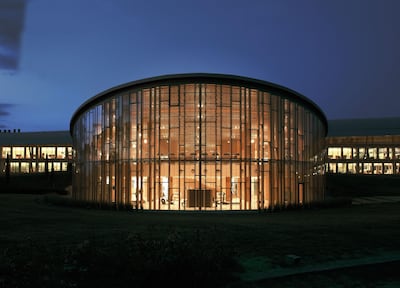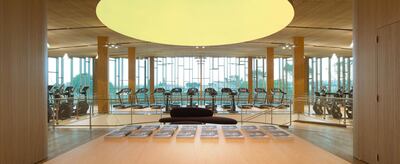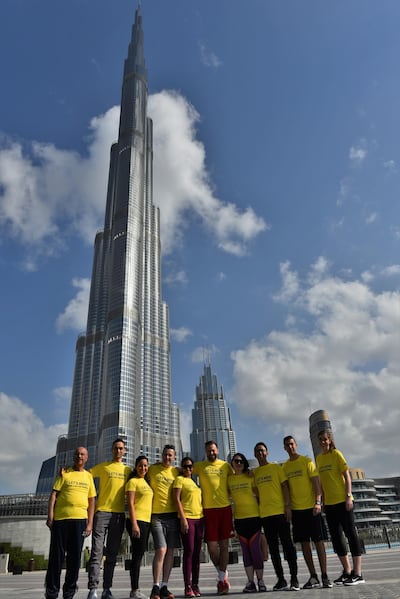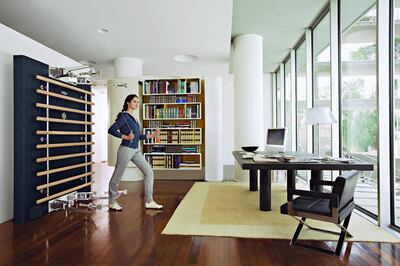Armani Hotel Dubai has become the latest company to participate in the Let's Move for a Better World campaign, kicking off the drive with a morning walk for its employees in Downtown Dubai last Wednesday. The social challenge, which is aimed at fighting obesity and motivating communities to adopt a more active lifestyle, is the brainchild of Technogym, the company responsible for creating some of the most advanced and beautifully designed fitness equipment in the world.
Standing in front of the Technogym Village headquarters, you could easily forget that you are close to a motorway that runs past a mid-size Italian rural town, and mistake the place for a tech venture in California's Silicon Valley. In fact, it is called the "Wellness Valley", a name coined by the man I am about to meet. Nerio Alessandri, Technogym's founder and president, has created a very deliberate lifestyle district on his company's premises.
At the reception desk, every visitor is provided with a map, even though the campus is well signposted. Given the size of the place, though, it is quite a long walk across a pedestrian path from the reception doorway to where I need to be. A robotic lawnmower constantly moves around, keeping the grass at the perfect length, and Bose speakers, strategically hidden among the bushes, emit lounge music in the background.
From a distance, one way to describe the futuristic facility, on the outskirts of Cesena, a small provincial town in the Italian countryside, is jaw-dropping. The massive wood and aluminium building, covered with crystal-clear glass windows from floor to ceiling, was designed by innovative Italian designer Antonio Citterio. When it opened in 2012, former United States president Bill Clinton flew in from New York to attend the ceremony.
A commitment towards public health
When I meet Alessandri, he looks utterly fit: lean almost to the point of being skinny. After all, he is the man who keeps the world in shape. From Canada to Australia, people train on the treadmills, spinning bikes and machines built in this very factory. "Our body has been engineered by nature and evolution to walk 30 kilometres a day. Our ancestors, back in the Neolithic era were hunters. They chased prey every day to feed themselves and their families". But the problem, Alessandri says, is that today the smartest predator that has ever lived hardly "walks 1km a day".
As a result of this sedentary lifestyle, public health costs are skyrocketing, as is the prevalence of heart disease and diabetes – a big issue in the UAE. "A person is born to move; not to eat. People were used to eating a little and healthy food for ages. Now it's burgers and fries. Their bodies have not adapted yet," Alessandri explains. He has a strong commitment towards public health; Technogym was a partner in this year's Dubai Fitness Challenge initiative, for example, while the Let's Move for a Better World campaign has been running since 2014.
The humble beginnings
Technogym, which is arguably the go-to global brand for fitness, began in a garage in the 1980s. This trajectory, from humble beginnings, again resembles a Silicon Valley success story. A young Alessandri and his wife designed the first training equipment, and were heavily influenced by the Arnold Schwarzenegger bodybuilder prototype, which was popular in that decade. And so Technogym was born as a lifts and weights supplier to the bodybuilders of the Italian Riviera. Part of this was cultural. Italians were already obsessed with the good-looking body and the idea of the Italian as a bon vivant has been immortalised in, for example, the films of Federico Fellini.
Thirty years on and Alessandri has reintroduced fitness to the US – a feat comparable to selling ice to Eskimos – and floated his company on the Italian stock exchange in 2016 at a valuation of €650 million (Dh2.69 billion). However, he personally did not sell any of his own stock, and his family retains the majority ownership.
Promoting a healthy lifestyle for all
Rumour has it that the "King of Wellness" is an exercise addict and requires the same level of intensity from his employees. The first hint of this comes from the cafeteria downstairs. A glass lift sits on hand, but Alessandri does not allow people to use it. "It's only for those who really need it," he says, as he walks down the stairs. Far from the dull and grey environs that dominate most corporate cafeterias, this one, which serves only organic food, resembles a casual-dining restaurant. It is stylish, with chefs cooking meals from fresh ingredients.
At Technogym, a healthy lifestyle is taken very seriously, especially when it comes to food. A big chalkboard provides employees with a calorie pyramid, offering a guide to how much they should consume. If you do a lot of exercise in the morning, you're rewarded with a big lunch. If you spend all the day seated in meetings, your meal will be reduced to a light salad. While there is no official enforcement of these guidelines, the overall health-conscious environment means staff are very committed to them anyway.
At the back of this futuristic office lies the factory itself. Throughout, a walkbridge is suspended from the ceiling. Dozens of workers operate 12 production lines here. They manufacture the famed Technogym treadmills and all the other devices that people throughout the world will use. Some of this equipment will be loaded onto trucks and eventually shipped to the UAE, where Technogym has several showrooms that cater to gyms and private buyers alike.
Technogym's success in the UAE
"People in the Emirates are sports fanatics and love to exercise," says Alessandri. Armani Dubai aside, Technogym devices are available to guests in almost every luxury hotel in the UAE, from Dubai's Atlantis, The Palm, Emerald Palace Kempinski and Bulgari Hotel and Resort – the latter also designed by Citterio – to The Ritz Carlton and The St Regis in Abu Dhabi.
Gyms and fitness centres such as The Michael Johnson Performance Centre, IGO club, Warehouse Dubai, Sharjah Shooting Club and Body & Soul are all Technogym clients. Companies, too, are starting to introduce fitness areas, and the gym has become a fringe benefit that employees (especially millennials) are eager for.
Technogym's worldwide sales were just short of €600m in 2017, with Europe its number one market, and the US and China growing fast. Alessandri says the Middle East is strategically important and it traditionally dominates luxury hospitality in the region.
However, some say Technogym is more about design than substance, and rivals such as LifeFitness in the US have superior technology. Alessandri dismisses this criticism and says, while he respects the competition, he believes that Technogym is playing a different game. “We are not just selling fitness machines; we are offering premium equipment for well-being.”
Looking to diversify their products
The company's research and development department consists of 200 people – doctors, sport scientists, mechanics, electronic and software engineers, industrial designers and data analysts. Technogym carries out innovation and research projects with top international universities, Alessandri says. Professional athletes also play a crucial role in terms of feedback, testing and inspiration for innovation, including Ironman Giulio Molinari and Olympic champion skier Marcel Hirscher.
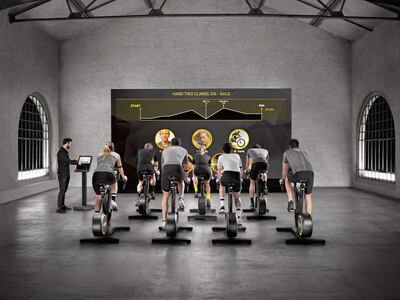
“Today we have 300 patents. Technogym was the first company to launch heart-rate-controlled equipment, the first to launch software to manage training, the first to introduce built-in entertainment and digital services.”
The evolution of its products is evident at the Cesena headquarters, where the company's first muscle-building machine is on show in a small museum within the campus. It's heavy-iron hardware compared to the sleek design of the modern equipment, with their distinctive black and yellow patterns, and futuristic design. It's not just a training device; it's a piece of furniture, says Alessandri. "The Kinesis, a training wall, is one of the bestselling devices in the UAE, especially the one in the gold colour version: customers like to showcase it in the living room, like they might a sofa or a library," he says.
"Dubai is a different market for us compared to Abu Dhabi; the first one is a leisure and tourism city; the capital is more on the medical and institutional side. So we want to diversify our products," he adds. "Technogym is not all about being fit and body-beautiful. Medical and rehab centres, in a world where people get older every day, will be the market of the future."

